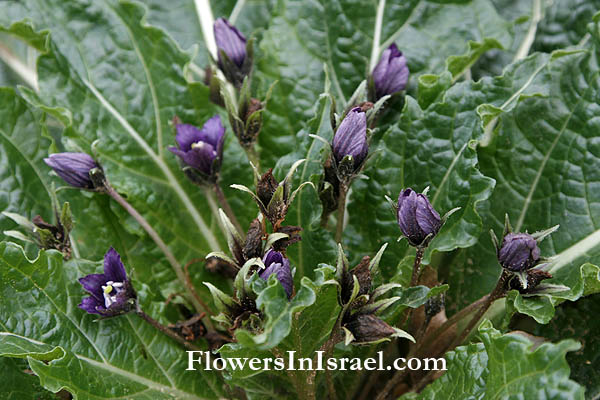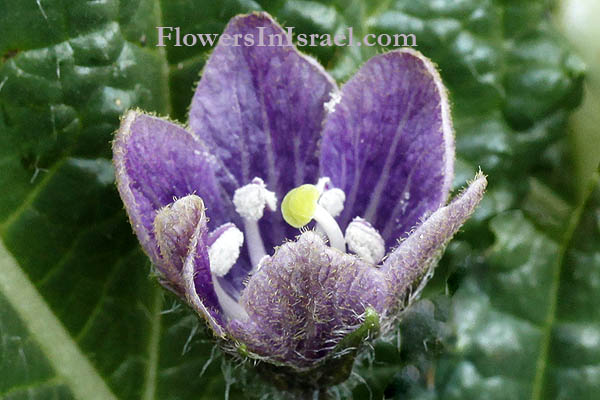
Derivation of the botanical name:
Mandragora, mandra, relating to cattle, and agaron, baneful, injurious, together implying "hurtful to cattle". Greek and Latin mandragoras for a plant, mandrake, perhaps from the Persian mardumgia "the plant of the man". The Mandragora has somewhat vaguely the shape of a human body. Their roots, because their curious bifurcation cause them to have a semblance to the human figure (male & female), have long been used in magical spells and witchcraft.
autumnalis, pertaining to autumn.
The Hebrew name: דודא, duda, (pl. דודאים ), mandragora, mandrake (in the Bible it occurs only in the plural, Gen. 30:14-16 and Cant. 7:14). Probably related to דוד (- beloved), and properly meaning ‘love-exciting (plant’.
The Arabs knew the plant as "Satan's apple."
- The standard author abbreviation Bertol is used to indicate Antonio Bertoloni (1775 – 1869), an Italian botanist.
The Mandragora is the mandrake of the Bible, of Rachel and Leah, who indulged in witchcraft with them, down to Jeanne d;Arc and Shakespeare. In the secret catechism of the Druses, the sons of God create men by descending to earth and animating seven mandragoras -- i.e., mannikins.
Theophrastus (c.372-c.287BCE) :
"...it is said that one should draw three circles round the mandrake with a sword, and cut it with one's face toward the west; and at the cutting of the second piece one should dance around the plant and say as many things as possible about the mysteries of love."
Gaius Plinius Secundus (Pliny the Elder) (23 - 79):
"...[mandragora is] given for injuries inflicted by serpents and before incisions or punctures are made in the body, in order to insure insensibility to pain. Indeed for this last purpose, for some persons the odour is quite sufficient to induce sleep."
Pedanius Dioscorides (Greek: Πεδάνιος Διοσκορίδης; ca. 40-90) De Materia Medica, Book 4, chapter76:
"Mandagoras has a root that seems to be a maker of love medicines. There is one sort that is female, black, called thridacias, with narrower, longer leaves than lettuce, with a poisonous, heavy scent, scattered on the ground. Among them are apples similar to serviceberries
— pale, with a sweet scent — in which is seed like a pear.
The two or three roots are a good size, wrapped within one another, black according to outward appearance, white within, and with a thick bark; but it has no stalk. The male is white, and some have called it norion. The leaves are bigger, white, broad, smooth like beet but the apples are twice as big — almost saffron in colour, sweetsmelling, with a certain strength — which the shepherds eat to fall asleep. The root is similar to that above, yet bigger and paler, and it is also without a stalk. The bark of the root is pounded and juiced while it is fresh, and placed under a press. After it is stirred the beaters should bottle it in a ceramic jar. The apples are also juiced in a
similar way, but the juice from them becomes weakened.The bark from the root is peeled off, pierced with a thread, and hanged up in storage. Some boil the roots in wine until a third remains, strain it, and put it in jars.
They use a winecupful of it for those who cannot sleep, or are seriously injured, and whom they wish to anaesthetise to cut or cauterize. Twenty grains of the juice (taken as a drink with honey and water) expel phlegm and black bile upward like hellebore, but when too much is taken as a drink it kills. It is mixed with eye medicines, medications to ease pain, and softening suppositories. As much as five grains (applied alone) expels the menstrual flow and is an abortifacient, and put up into the perineum as a suppository it causes sleep. The root is said to soften ivory, boiled together with it for six hours, and to make it ready to be formed into whatever shape a man wants. Applied with polenta, the new leaves are good both for inflammations of the eyes and ulcers."
Jeanne d'arc, Joan of Arc, (c.1412-1431), the Great Trial of 1431:
"What have you done with your mandrake?"....(The mandrake was a part of the accepted paraphernalia of a sorcerer. It was kept wrapped in a silk or linen cloth, and was supposed to preserve its owner from poverty. Brother Richard had recently preached a sermon against them (April, 1429); and many had been burned in consequence.)
"I never have had one. But I have heard that there is one near our home, though I have never seen it. I have heard it is a dangerous and evil thing to keep. I do not know for what it is [used]."
"Where is this mandrake of which you have heard?"
"I have heard that it is in the earth, near the tree of which I spoke before; but I do not know the place. Above this mandrake, there was, it is said, a hazel tree."
"What have you heard said was the use of this mandrake?"
"To make money come: but I do not believe it. My Voice never spoke to me of that."
The Maid of Orleans was reputed to make use of mandrake. There were various factors which exposed La Pucelle to charges of witchcraft. Joan of Arc said the ‘voices' which inspired her came from St Michael, St Catherine and St Margaret - saints whose statues stood in Domremy village church - but her enemies declared that she spoke to evil spirits. Some said the voices were hallucinations induced by chewing mandrake, a narcotic which they believed Joan carried in her bosom. Jeanne d'arc was summoned before her judges, declared a relapsed heretic and a sorceress, and on the 3Oth of May 1431, she was burned at the stake in the market place in Rouen.
Shakespeare, William, 1564-1616,in 'King Henry IV', Part 2:"Thou whoreson mandrake, thou art fitter to be worn in my cap than to wait at my heels";
in 'Antony and Cleopatra': “Give me to drink mandragora… That I might sleep out this great gap of time My Antony is away”; and in Romeo and Juliet:"And shrieks like mandrakes torn out of the earth, that living mortals, hearing them, run mad."
H.B.Tristram, Natural History of the Bible: "Mandrakes. Heb. dudâim, i.e., love-plants.The Mandrake has been the subject of many strange superstitions. It was said that it resembled the shape of a man, and that it shrieked and groaned when dug up; that the usual mode of procurring it was by tying a dog to the plant, whose struggles tore it up, but that the dog was killed by the shricks! The Mandrake is universally distributed in all parts of Palestine, and its fruit is much valued by the natives, who still hold the belief, as old as the time of Rachel, that when eaten it ensures conception."
Michael Zohary, Plants of the Bible: "Dudaim in Genesis 30:14-15 can certainly not be Mandragora, which has never grown in Mesopotamia, where Jacob, Leah and Rachel lived."
Bible resources:
- Genesis 30:14-16
During wheat harvest, Reuben went out into the fields and found some mandrake plants, which he brought to his mother Leah. Rachel said to Leah, “Please give me some of your son’s mandrakes.”
But she said to her, “Wasn’t it enough that you took away my husband? Will you take my son’s mandrakes too?”
“Very well,” Rachel said, “he can sleep with you tonight in return for your son’s mandrakes.”
So when Jacob came in from the fields that evening, Leah went out to meet him. “You must sleep with me,” she said. “I have hired you with my son’s mandrakes.” So he slept with her that night.
- Song of Solomon 7:13
The mandrakes send out their fragrance, and at our door is every delicacy, both new and old, that I have stored up for you, my beloved.
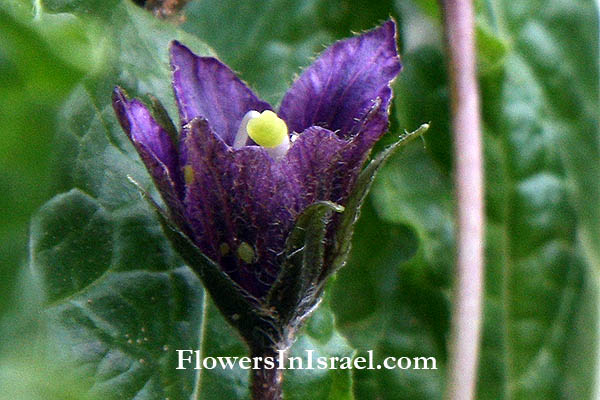
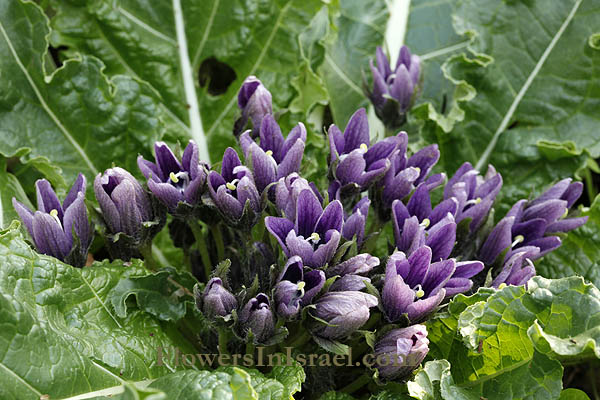
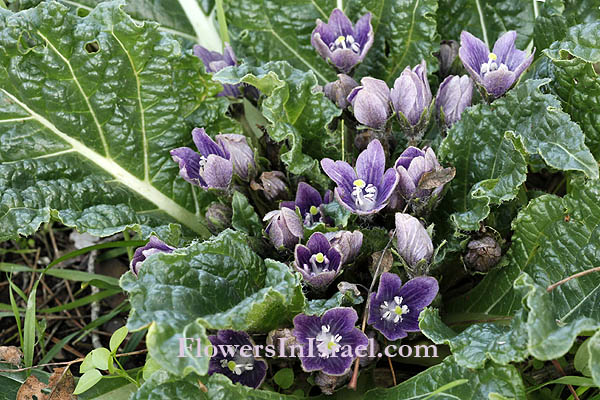
|
